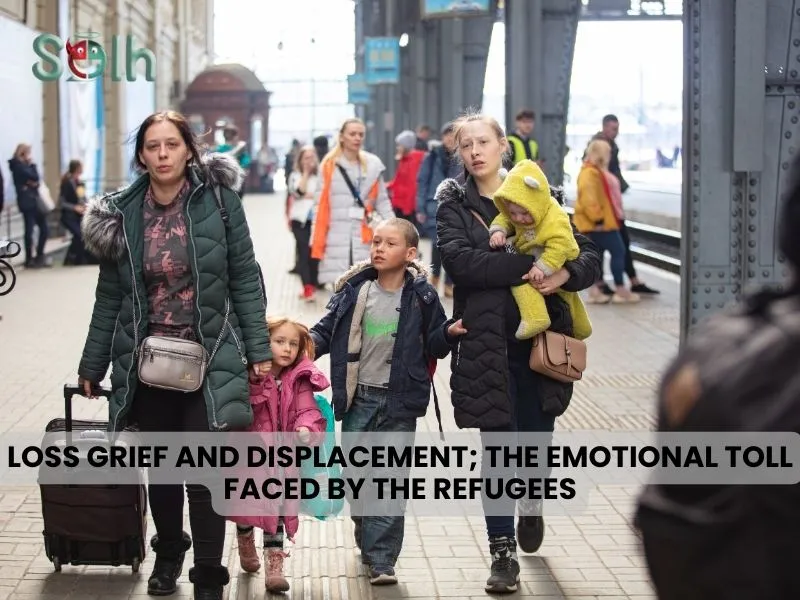The twenty-first century has seen unprecedented amounts of human relocation as a result of conflict, persecution, and natural calamities. According to the United Nations High Commissioner for Refugees (UNHCR), over 100 million people will have been forcefully displaced worldwide by the end of 2022. A large percentage of them are refugees, who not only lose their homes and sources of money but also face enormous emotional and psychological challenges. For refugees, the voyage is more than just a physical move; it is a deeply distressing experience marked by loss, sadness, and dislocation.
The Refugee Emotional Trauma
Refugees experience a profound sense of loss that begins with the immediate and concrete displacement from their homes, possessions, and communities. Their homes, often the heart of family life, cultural customs, and cherished memories, are abandoned or destroyed. This physical loss is compounded by the absence of personal belongings, which, despite appearing ordinary, carry significant sentimental value. Photographs, family heirlooms, and other personal items are frequently irreplaceable, serving as a tangible connection to their history and sense of self.
Refugees not only experience physical challenges but also suffer from the deep emotional impact of losing their social connections. Their communities become divided, and their loved ones may be separated, sometimes for an extended period. The loss of social support networks, which offer emotional reinforcement and a feeling of inclusion, leads to refugees feeling alone and defenseless. This separation is particularly distressing for children, who lose the security and comfort provided by familiar people and surroundings.
Loss and Grief Impact
The journey of being a refugee is filled with deep and enduring sorrow. Countless refugees have witnessed the death of their relatives, friends, and community members due to conflict or perilous travels. The severe mental toll of these horrific events is understated. Those who survive often carry a heavy burden of guilt for their survival, leading to a complex and crippling type of grief called survivor's guilt.
For individuals who have lost their loved ones, the usual ways of grieving and finding closure are interrupted. In many societies, traditions and the support of the community are essential for the grieving process. Yet, refugees often miss out on these traditions due to being forced to leave their homes, leaving their sorrows unaddressed. This can result in prolonged grieving, depression, and post-traumatic stress disorder (PTSD).
Displacement Stress
The process of being forced to leave one's home is a major cause of mental distress. The journey from one's home to a safe haven is frequently filled with peril, uncertainty, and hardship. Those seeking refuge may endure weeks, months, or even years on the move, facing dangerous conditions, a shortage of basic needs, and the perpetual risk of violence or exploitation. The strain from these experiences can severely impact mental health, leading to conditions like anxiety, depression, and other psychological issues.
Even after reaching a location considered safe, refugees face the daunting task of adjusting to unfamiliar surroundings. Differences in culture, language barriers, and the lack of a support system can intensify feelings of loneliness and powerlessness. The refugee camps or temporary shelters, where many find themselves, often lack proper facilities, privacy, and security, adding to the psychological burden.
The Effects on Young Ones
Young people, constituting a significant part of those displaced, are especially susceptible to the emotional hardships of being forced to leave their homes. The disruption of their home life and stability can interfere with their growth, education, and sense of safety. Being exposed to violence and the trauma of escaping can lead to enduring psychological impacts, including behavioral issues, difficulties in learning, and emotional problems.
The absence of formal education and structured activities in refugee settings means that children miss out on important learning and socialization opportunities. This not only affects their intellectual growth but also deprives them of the coping strategies that structured environments can offer. The lack of mental health support for children in refugee situations is a critical issue that demands immediate attention, as their early experiences will shape their future mental and emotional health.
Strategies for Survival and Strength
Despite the overwhelming obstacles, displaced individuals often show incredible strength and resilience. Strategies for coping are diverse but commonly include holding onto cultural and religious traditions, building new social connections, and finding ways to keep their cultural heritage alive. These activities offer a sense of continuity and identity in times of turmoil.
Religious beliefs can provide comfort and a structure for understanding and enduring suffering. Many refugees turn to prayer, religious ceremonies, and community gatherings for strength and hope. Moreover, the arts and storytelling serve as therapeutic outlets for expressing sorrow and preserving cultural identity. Through music, dance, and oral histories, refugees can share their stories and maintain a connection to their homeland.
The support of the community is another essential element in building resilience. Refugees who are able to reestablish social ties, even in temporary settings, gain from shared resources and emotional backing. Grassroots organizations and non-governmental organizations (NGOs) are crucial in facilitating these connections and providing vital services, including mental health care, legal aid, and educational programs.
The Role of Host Countries and International Community
The mental health of refugees is not just their responsibility to manage. It's the duty of the countries they seek refuge in, as well as the global community, to offer thorough assistance that meets their physical and mental health requirements. This involves making sure they have access to mental health care, ensuring their living spaces are safe and respectful, and creating settings that support refugees in starting over.
Mental health care should be a part of the basic health services provided to refugees. This means educating medical staff on identifying and treating conditions like PTSD, depression, and other prevalent mental health problems among refugees. It's also important to use culturally appropriate methods, recognizing that refugees come from varied cultures and may have different views and ways of dealing with mental health.
The education systems in the countries that host refugees need to be welcoming and flexible, enabling refugee children to keep learning with as little interruption as possible. Offering language courses, one-on-one tutoring, and emotional support can help close the divide and make the transition easier. For adults, learning new skills and finding jobs are key to regaining a sense of direction and independence.
The emotional toll endured by refugees is a complicated interplay of loss, grief, and displacement that affects every part of their existence. While the obstacles are enormous, the perseverance demonstrated by migrants is equally impressive. However, resilience is not enough. Comprehensive and culturally responsive help from host countries and the international community is required to treat the significant psychological consequences of displacement. Only through such concentrated efforts will we be able to alleviate refugees' suffering and help them rebuild their lives with dignity and hope.
While finding ways to combat Loss and grief, remember it is a journey and not a destination to arrive at. The key is to be proactive, indulging in new experiences and nurturing the existing ones. Yes! You are going to face a lot of ups and downs but remember to focus on the ups and learn from your downs. With each step at a time you are moving towards a life you imagined. You are not alone in this journey! You can overcome loneliness.
Solh can be a helpful tool to support someone dealing with grief and other mental health challenges , but it's important to understand its role as part of a larger approach. Here's how Solh's features can be relevant:
Normalizes Seeking Help: Solh combats the stigma often associated with mental health by creating a judgment-free zone. This can be encouraging for someone struggling with grief to reach out for professional help.
Anonymous Support Groups: Connecting with others who understand grief can be invaluable. Sharing experiences and realizing they're not alone can be a powerful source of comfort and motivation.
Talk Now: The easy access to confidential consultations through the app can be a great first step for someone dealing with grief who might hesitate about traditional in-person therapy.



